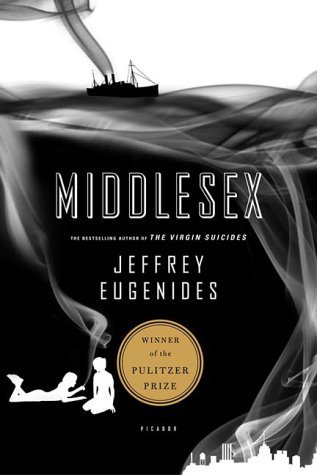 I couldn't help it this time, I think. What between work and editing The Greats, and trying to eke out some form of social existence along the way, the reviews have gone sadly by the wayside.
I couldn't help it this time, I think. What between work and editing The Greats, and trying to eke out some form of social existence along the way, the reviews have gone sadly by the wayside.But a new resolution is to post much more regularly.
Starting...now.
So let's take a look at a book I polished off today, home sick from work with a migraine. Cormac McCarthy's The Road isn't exactly what most people might pick up for some light reading. On the one hand, it was, I thought, pretty disturbing and had some moderately horrifying and extremely violent details.
Case in point: the body of a headless infant being roasted on a spit over a fire.
I couldn't even type that without feeling my flesh crawl.
But this is getting off on the wrong foot. What I'm trying to say is that despite details that were graphic and explicit--both of physical and emotional turmoil--I think this book is an incredible testament to the nature of goodness and the persistence of compassion, especially that of children, even in the most excruciating circumstances.
So, starting with that lofty little affirmation, what is The Road about, exactly? Unfortunately, I'm not able to tell you, exactly. That is, the gist is that the world has been ravaged by something that caused the sun to effectively go out (or perhaps by the sun's own flares, which, biologically speaking, could, potentially, cause it to go out).It's cold. It's dark. When it snows (which is does a whole lot) it's grey. And, to add insult to post-apocalyptic injury, the few people that are left are largely a sick, almost tribal species that loots, kills, rapes, enslaves, and cannibalizes.
But amid all this, there's a nameless father and son trying to survive. The father does whatever it takes--heroic and incredibly touching--to defend and nourish his child. The boy, for his part, is only about 9 or 10, and has little to no memory of what the world used to be. Despite that, though, he still holds out hope for the goodness of humanity, and has an incredible empathy for everyone they meet that seems to transcend (or perhaps illustrate?) his age.
What I loved about the book was, undeniably, the style (even the paragraphs are blocks of text, with nary a decoration--even at the expense of apostrophes in conjunctions), and the exquisite hopelessness with which it was written. In the grand scheme of things, not a whole ton happens. They scavenege for food everywhere, they avoid and sometimes run into some really brutal people, and some really unfortunate ones, they run out of food, they make camp, etc. But the writing is so taught and airtight, so incredibly full of the expectation of something horrible, that every page turn leaves you on edge. It completely captured the world they lived in--where danger lay in wait and you had to expect the worst everywhere.
It also really got to an ugly, ugly core of humanity, and brought it, glistening in all of its pus and decay, to the forefront of the story. I think, speaking theoretically, if the world ended tomorrow for all save, perhaps, a hundred or so people in total, we would all like to think that those hundred people would find each other and build a community and start the world anew. I think we'd all expect that, to some extent, the idea that you were the last ones standing would somehow bond you together in a way that allowed you to put aside notions of power and race and greed. But McCarthy very deftly allows for a situation where those aspect of society aren't simply brushed away by disaster. Instead, they're magnified to the extent that women are kept around and impregnated constantly so that the children can be eaten. Certain groups and characters in the novel effectively turn humans into nothing more than sources of food. It's sick. It's disgusting. But as you read, part of you really wonders whether or not every one of those last hundred or so people would be able to do the "good" thing, and try to rebuild instead of take advantage and pollute. McCarthy's answer, it seems, is both yes and no. Some people would reveal the most criminal parts of themselves, while others, like the father and son, maintain their identities as "good guys."
Part of me, on reflection, thinks that that's due to the presence of the boy. There were times in the novel where it looks like the father would have killed / stolen / etc on behalf of their survival, but the boy's conscience always keeps them from doing anything that might be anything less than good. It's a beautiful notion--the overcoming of fear and starvation and the distrust of virtually all other people to arrive at a place where you do everything you can to maintain your "goodness." And so that's the running question in the boy's mind: Are we still the good guys? Are we carrying the light?
In the end, they ARE carrying the light.
And (lest I try to escape a post without indelible cheesiness), I'm holding a flame for this book.
FINAL VERDICT:
***** out of *****






